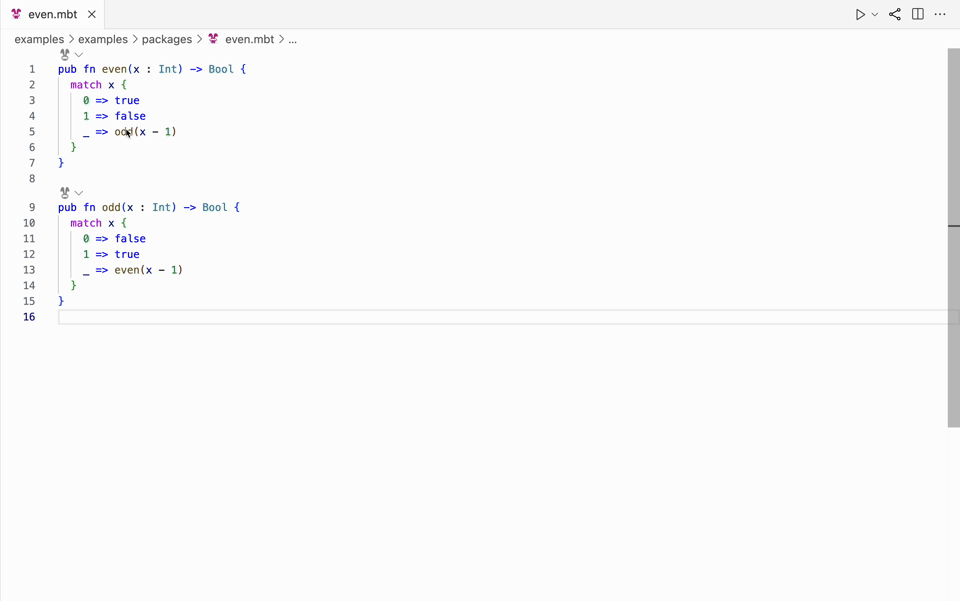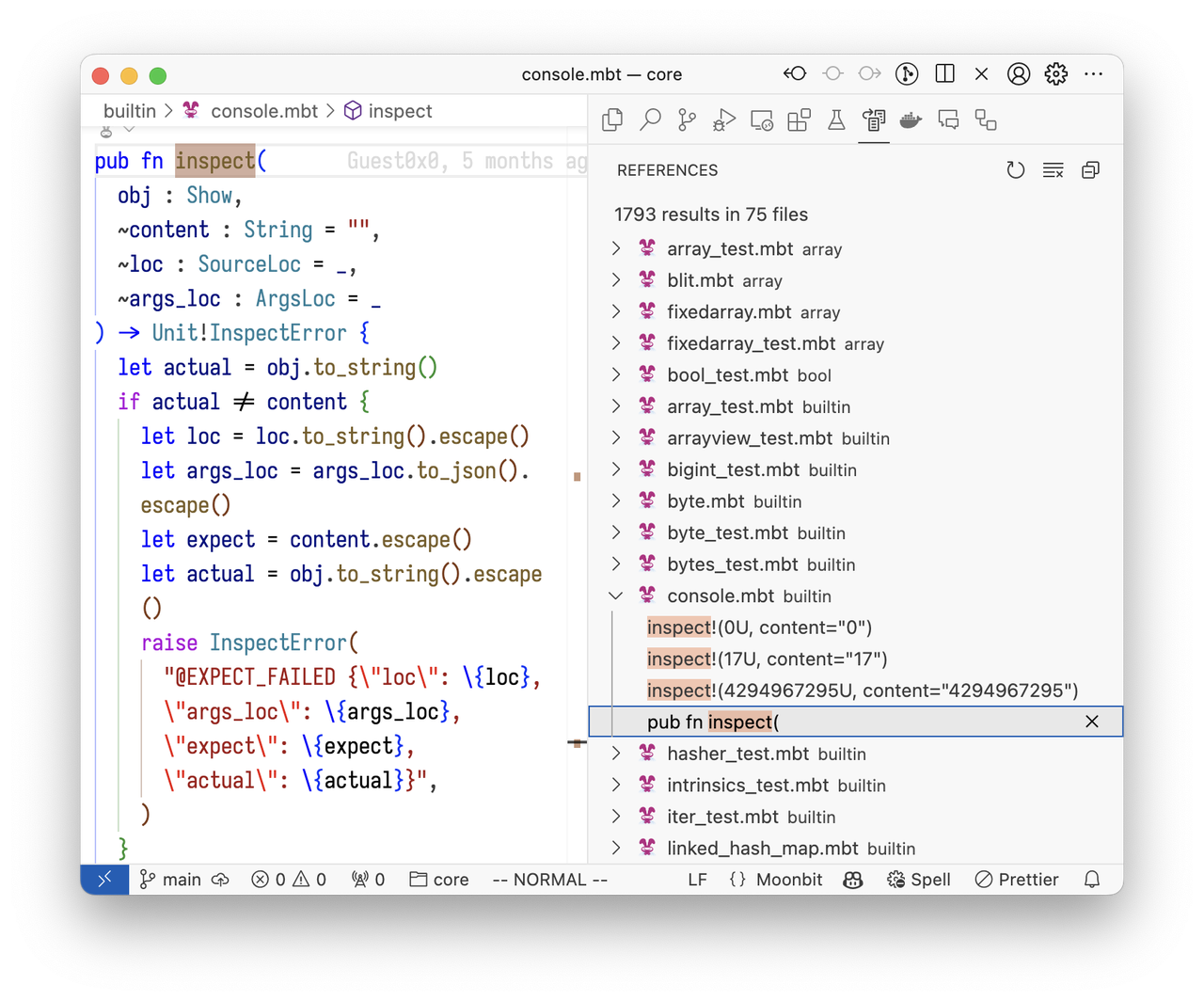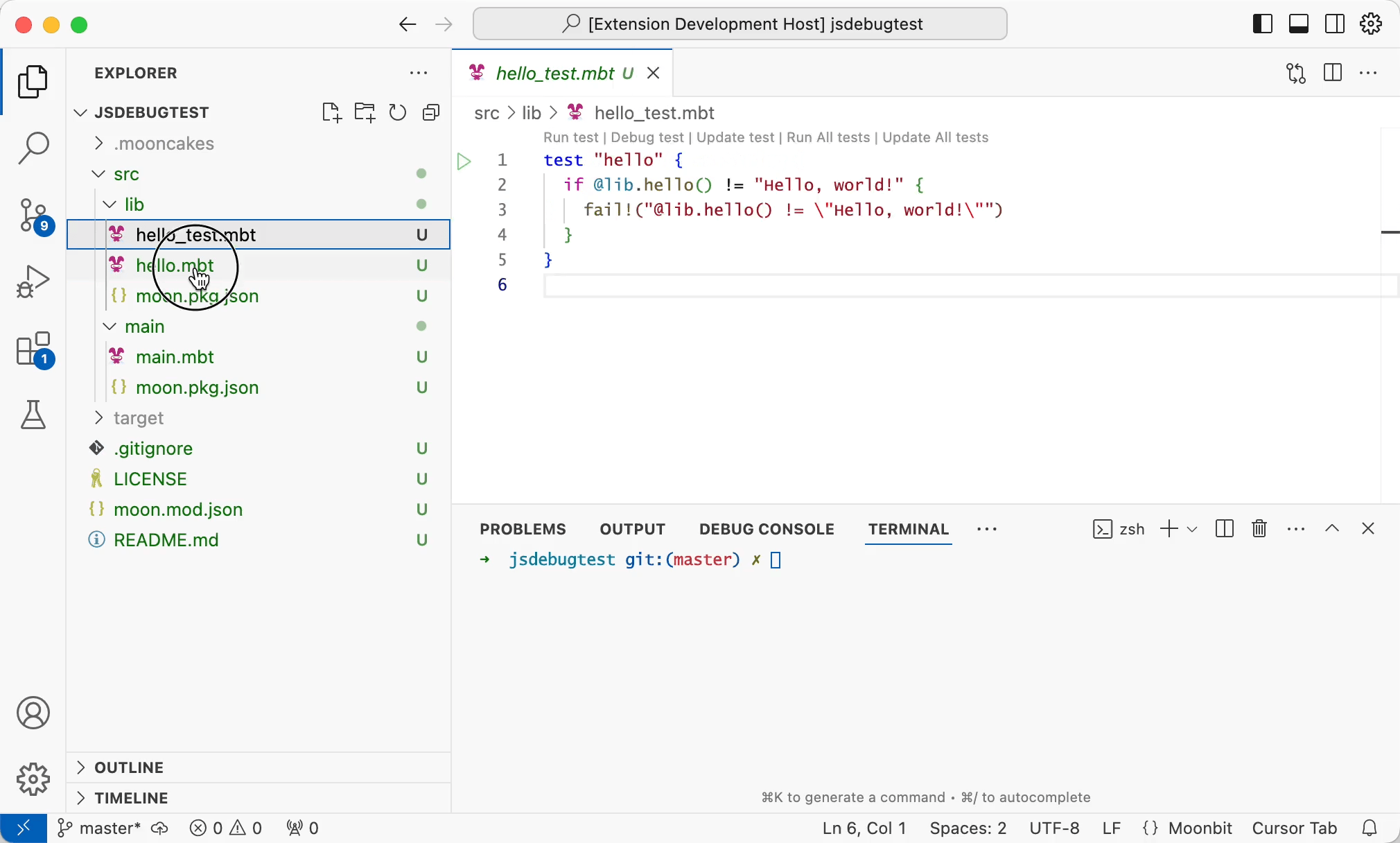Weekly 2024-09-03
Language Updates
- Breaking Change: String interpolation syntax changed from
\()to\{}where more expression types within\{}are supported. For example:
fn add(i: Int) -> Int {
i + 1
}
fn main {
println("\{add(2)}") // cannot invoke function in \() before
}- New Optional Argument: Supported a new optional argument syntax where the compiler automatically inserts the
Someconstructor. Optional arguments of typeOptionare common, with a default value ofNone, and explicitly passed arguments use theSomeconstructor. The new syntax~label? : Tsimplifies this process:
fn image(~width?: Int, ~height?: Int, ~src: String) -> UnitPreviously, we had to manually insert lots of Some constructors with the default value, which is quite troublesome.
image(width=Some(300), height=Some(300), src="img.png")Therefore, MoonBit introduced a new optional argument syntax ~label? : T, which is quite similar to ? in map pattern:
fn image(~width?: Int, ~height?: Int, ~src: String) -> UnitAt this point, width and height are optional arguments with a default value of None, and their types in the function body are Int?. When calling image, if you want to provide values for width and height, you don't need to manually insert Some; the compiler will automatically do it for you:
image(width=300, height=300, src="img.png")If you need to pass an Int? type value directly to image, you can use the following syntax:
fn image_with_fixed_height(~width? : Int, ~src : String) -> Unit {
// `~width?` is shorthand for `width?=width`
image(~width?, height=300, src="img.png")
}- Range Operators: Added support for range operators
..<(upper bound exclusive) and..=(upper bound inclusive) to simplifyforloops:
fn main {
for i in 1..<10 {
println(i)
}
}Currently, the range operators only support the built-in types Int, UInt, Int64, and UInt64, and they can only be used within for .. in loops. In the future, these limitations may be relaxed.
-
expr._replaces<expr>.0: Introducedexpr._syntax for accessing newtypes. The previous syntax<expr>.0will be deprecated in the future, and currently, it will trigger a warning. The purpose of this change is to simplify the usage ofnewtypewhen wrapping astructor tuple type by automatically forwarding field access to the underlying type, making it easier to usenewtype. -
Trait Implementation Consistency: Implementing a
traitnow includes consistency checks to ensure that allimplsignatures match. For example:
trait MyTrait {
f1(Self) -> Unit
f2(Self) -> Unit
}
// The signatures of these two `impl` blocks are inconsistent,
// with `f2` being more generic. However, because `impl` is used
// to implement a specific trait, this generality in `f2` is meaningless.
// All `impl` blocks for the same trait and type should have consistent signatures.
impl[X : Show] MyTrait for Array[X] with f1(self) { .. }
impl[X] MyTrait for Array[X] with f2(self) { ... }Core Update
-
Deprecate
xx_exn: Functions namedxx_exnhave been renamed tounsafe_xx(e.g.,unsafe_pop,unsafe_nth,unsafe_peek). -
Breaking Change: Converting floating-point numbers to strings now conforms to the ECMAScript standard.
-
Function Update: The
op_as_viewfunction type signature has been updated for compatibility with the new optional argument syntax.
Before:
fn op_as_view[T](self : Array[T], ~start : Int, ~end : Int) -> ArrayView[T]Now:
fn op_as_view[T](self : Array[T], ~start : Int, ~end? : Int) -> ArrayView[T]This allows the Iter type to implement the op_as_view method, enabling slice syntax:
fn main {
let it: Iter[Int] = [1, 2, 3, 4].iter()[1:2] // slice syntax on iter
for x in it {
println(x) // 2
}
}As the new optional argument syntax ~end? : Int is backward compatible, all previous ways of calling op_as_view still work and maintain the same semantics.
-
Renaming:
Int::to_uintandUInt::to_inthave been renamed toInt::reinterpret_as_uintandUInt::reinterpret_as_int. -
Removal and Fixes: The
BigInt::lsrfunction was removed, and bug fixes and performance improvements were made toBigInt.
Toolchain Updates
-
Breaking Change: The Diagnostic information text for
moon {build,check,test,run}(such as printed errors and warnings) has been moved from stdout to stderr to avoid pollution of stdout output with error and warning details when runningmoon {test,run}. If your tools rely on stdout text-format diagnostics, please update your code accordingly.JSON mode output is unaffected.
-
MoonBit AI: Supports batch generation of tests and documentation.

- New Feature: Snapshot testing is now supported, similar to
inspect!, but results are written to a file. For example, when runningmoon test -u, the following test block will generate a file001.txtin the__snapshot__folder:
test (it : @test.T) {
it.write(".")
it.writeln("..")
it.snapshot!(filename="001.txt")
}Note that snapshot testing ignores LF and CRLF differences.
-
Build Process Update:
moon buildnow supports building projects even withoutis-mainorlinkfields inmoon.pkg.json. These packages will only generate acorefile without linking towasm/js. -
Formatting Update:
moon fmtnow supports incremental formatting, initially formatting all.mbtfiles, then only formatting changed files in subsequent runs.
IDE Updates
- Project-Level Goto References: The IDE now supports project-level goto references. For example, you can find all references to a function like
inspectwithin thecore. In the pic, all references callinginspectare found:

- Test Block Debugging: Test blocks allows for quick debugging through codelens.
